IRGC Says Hamas Attack Retaliation For Soleimani Killing
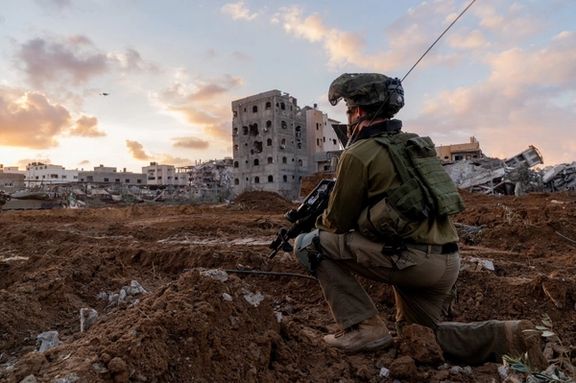
The Islamic Revolutionary Guard Corps (IRGC) says the October 7 attack by Hamas on Israel was a retaliatory action for the assassination of Qasem Soleimani.

The Islamic Revolutionary Guard Corps (IRGC) says the October 7 attack by Hamas on Israel was a retaliatory action for the assassination of Qasem Soleimani.
According to the IRGC-affiliated Fars News Agency, in a press conference held on Wednesday, Ramezan Sharif, the spokesperson for the IRGC said "The Al-Aqsa Storm was one of the retaliations of the Axis of Resistance against the Zionists for the martyrdom of Qasem Soleimani," the man behind Iran's proxy activities across the region.
The claims contradict the regime's usual stance which has distanced itself from the attacks even though it has supported them and celebrated the tragedy. Tehran asserts Hamas acted independently, in spite of years of huge financial and military support given to the Gaza based militants from Tehran.
The terror attack which saw at least 1,200 mostly civilians killed and 240 more taken hostage, was the most deadly single day for Jews since the Holocaust and has since seen an escalation of tensions from Iran's proxies across the region, both attacking Iran and the US, in addition to blockading the Red Sea.
Soleimani, a key figure in Iran's external military and intelligence operations, was killed in a US drone strike near Baghdad International Airport on January 3, 2020.
Soleimani was accused by then-President Donald Trump of actively planning attacks on American diplomats and service members in the region. He played a crucial role in supporting and organizing militant proxy forces, including Lebanese Hezbollah and Iraqi Shiite militia groups.
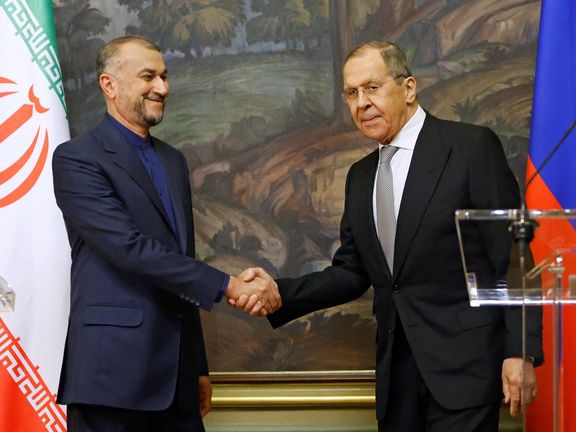
Iran and Russia's foreign ministers discussed the ongoing contentious issue of Iran's "territorial integrity" as the debate over three islands continues.
Iranian Foreign Minister Hossein Amir-Abdollahian and Russian counterpart Sergei Lavrov spoke Tuesday in the wake of the latest dispute between Iran and the United Arab Emirates' claims over three Persian Gulf islands, Abu Musa, Greater Tunb, and Lesser Tunb, which have historically been part of Iran as evidenced by historical and geographical documents.
However, the UAE has repeatedly claimed sovereignty over the islands, describing the situation as a “continuation of Iranian occupation.”
The Islamic Republic News Agency, IRNA, quoted Lavrov as saying that “Moscow is unwavering in its commitment to respecting Iran's territorial integrity,” but tensions flared following Russia’s recent move to sign a joint statement with the Gulf Cooperation Council (GCC) in Morocco in support of the UAE's right to file a lawsuit against Iran regarding the three contested islands.
Russia's decision to support the Arab claim is particularly humiliating to Supreme Leader Ali Khamenei, who has shown a particular affinity for Moscow and President Vladimir Putin. His policy has been to maintain close ties with Russia and China and to avoid opportunities to improve relations with the West.
China however also took a similar stance last year when it signed a joint statement with the GCC in which the UAE mentioned three Iranian islands in the Persian Gulf as a claim. But the backlash this time is more widespread, and it includes hard-liners as well.
Even Khamenei's most senior foreign policy adviser, former Foreign Minister Ali Akbar Velayati, criticized Russian behavior, saying, "Iran will not allow any foreign entity to intervene in its internal affairs."
In Tehran, legislators also expressed their dissatisfaction with Russia's stance, and some called for a serious review of Iran's foreign policy as well as a more comprehensive examination of the possible damages caused by these political maneuvers.
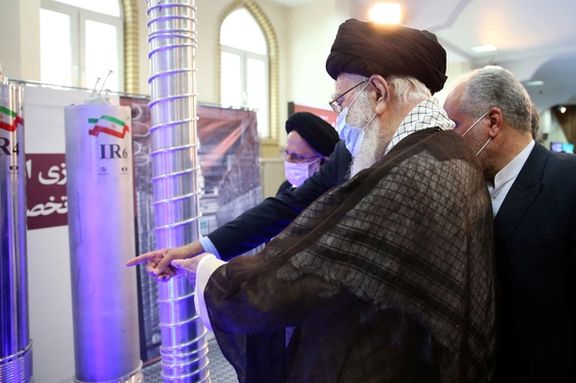
The White House says it is “greatly concerned” regarding the International Atomic Energy Agency (IAEA) report detailing Iran's heightened production of highly enriched uranium.
In a statement on Tuesday, a spokesperson for the National Security Council underscored the alarming nature of Iran's nuclear escalation, saying "Iran’s nuclear escalation is all the more concerning at a time when Iran-backed proxies continue their dangerous and destabilizing activities in the region, including the recent deadly drone attack and other attempted attacks in Iraq and Syria and the Houthi attacks against commercial shipping vessels in the Red Sea,"
The IAEA report, disclosed by Reuters on Tuesday, highlighted Iran's reversal of a prior slowdown in its uranium enrichment program since mid-2023, indicating an increase in the production of highly enriched uranium. The report revealed that Iran is currently enriching uranium up to 60% at both its Pilot Fuel Enrichment Plant (PFEP) in the Natanz complex and its Fordow Fuel Enrichment Plant (FFEP) situated within a mountain.
The report conveyed to member states that "since the end of November 2023, the rate at which Iran has been producing uranium enriched up to 60% U-235 at these two facilities combined has increased to approximately 9 kg per month." According to the IAEA's definition, once uranium enriched to 60% reaches around 42 kg, the possibility of using it to create a nuclear bomb cannot be dismissed. Currently, Iran possesses sufficient uranium enriched to 60% to potentially manufacture three nuclear bombs if subjected to further enrichment.
Responding to the IAEA report on Wednesday, Mohammad Eslami, Iran's atomic energy chief, dismissed the findings, asserting, "There is nothing new." Eslami emphasized that Iran had not introduced any new elements and is conducting its activities in accordance with established rules, as reported by Iranian media.

The US fleet in the Red Sea intercepted 17 drones and missiles on Tuesday, as Iranian officials promised to hit back at Israel for the killing of Iran’s ‘top man’ in Syria.
Escalation was palpable during the day, as destroyers and fighter jets from the USS Eisenhower were forced to shoot down “twelve one-way attack drones, three anti-ship ballistic missiles, and two land attack cruise missiles” in the Red Sea –all fired by Iran-backed Houthis in 10 hours, according to the US Central Command.
In Tehran, spokesmen for Iran’s government and Iran’s defense ministry repeated what seems to be the regime’s chosen message now: There will be a response to Israel’s killing of Razi Mousavi “at the right time and the right place.”
Razi Mousavi (aka Seyyed Razi) was killed by a direct Israeli airstrike Monday. He headed IRGC’s ‘logistics’ and military coordination in Syria, which may be better understood as being in charge of getting weapons or money for Iran-backed forces in Syria and Lebanon.
He had been active in Syria for more than 25 years, and had escaped multiple Israeli attempts on his life, according to reports in IRGC-affiliated media.
“This crime definitely deserves punishment. Israelis must pay the price for their recent terrorist actions,” said Reza Talaei-nik, Iran’s defense ministry spokesman in a press conference Tuesday. “Iran will give a smart and strong response to the Israeli strike at the appropriate time and place.”
There’s no clear indication of what a ‘response’ would look like. It is rather clear, however, that both the rhetoric and the action is intensifying on all sides.
And that includes the United States.
On Monday, President Biden ordered the US military to hit Iran-affiliated targets in Iraq almost immediately after drone attacks on a US base that left one American soldier critically injured. It was a swift response from an administration that has appeared reluctant to respond to more than 100 attacks by Iran-backed militias in Iraq and Syria.
But it doesn’t seem to have satisfied the critics –who want Joe Biden to “change course” completely and sharply.
“Retaliatory strikes are a reaction. We need to be proactive,” said Rep. Rob Wittman on Fox News Tuesday. “We need to go after where we know these attacks are coming from… The failed policy of capitulating to Iran is manifesting itself in what we’re seeing Iran doing in the region.”
The Biden administration may find it harder to cease fire if the current trajectory persists. Harsher attacks on US troops in Syria and Iraq, growing attacks on vessels in the Red Sea, and a potential act of belligerence from Iran –as seen in the strike on the oil tanker in the Indian Ocean last week– these would all push President Biden away from his de-escalation policy and towards confrontation with Iran.
“The irony is the non-escalation approach is actually making Iran more wealthy to further fuel terrorism in the region,” Rep. Mike Waltz said on Fox News Tuesday. “We’re not hitting back on things that Iran cares about.”
Would that not mean dragging US troops (and the US taxpayer) into yet another costly war riddled with uncertainty?
“I want to be clear: that’s not for some major military escalation,” explained Rep. Mike Waltz. “Reverse-course on Iran policy, go back to maximum pressure and dry up their coffers that are fueling terrorism across the region.”
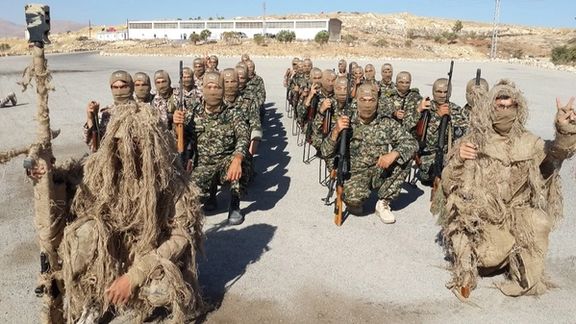
Unit 400 of the Quds Force of Iran's Islamic Revolutionary Guard Corps (IRGC) is recruiting Afghans for suicide attacks and working with Al Qaeda to target Israelis.
The Quds Force team responsible for recruiting Afghans includes Hossein Rahmani, Hossein Rahban, Hamed Abdollahi, and Alireza Tajik who was implicated in a plot to assassinate an Israeli businessman in Tbilisi, Iran International can reveal.
Iran's use of Afghans for targeting Israelis was first reported by The Israeli weblog Intellitimes.
In November 2022, Georgian security officials revealed that the Quds Force, the extraterritorial arm of Iran’s Revolutionary Guards, attempted to kill a prominent Israeli-Georgian living in Tbilisi.
Georgia later announced that the plot to kill Itsik Moshe, the chairman of Israel Georgia Chamber of Business had been masterminded by the IRGC-QF and implemented by Al Qaeda members.
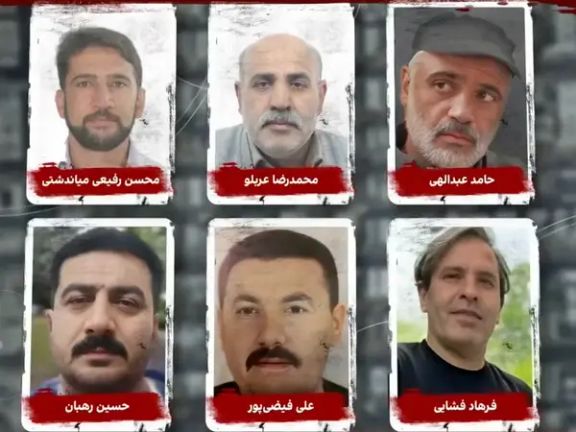
An Afghan-Iranian named Alireza Tajik and a Pakistani agent named Amir Khan were involved in the operation. Additionally, more reports point to Iran involving Pakistanis and Afghans in carrying out terrorist attacks.
The Israeli Foreign Minister, Eli Cohen, stated in July that Iran was responsible for a foiled attack on the Israeli embassy in Azerbaijan, “Tehran stands behind the attempt.”
At least three incidents involving alleged Iranian plots to target Israelis have occurred in Cyprus in more than a year according to AP. An alleged Iranian-backed hit squad planning to kill Israelis and other Jews was busted by Cyprus authorities in July.
It was reported in March that the Greek police arrested two Pakistani nationals who were alleged to be planning mass-casualty terrorist attacks against a Jewish restaurant and Chabad House in Athens. The perpetrators received orders from the IRGC.
"It seems that the Islamic Republic of Iran, Al Qaeda, and Taliban have put aside their religious differences for a broader war against Israel, using Afghan suicide bombers," Mojtaba Pourmohsen reported for Iran International.
Historically, the relationship between Al-Qaeda and Iran dates back to the early 1990s. During that time, al-Qaeda and Iran forged an agreement under which al-Qaeda members would train with Iranian intelligence operatives in Iran and Lebanon's Bekaa Valley.
After 9/11, Abu Hafs al-Mauritani and Mustafa Hamid, bin Laden's emissaries, were able to negotiate a deal with Iranian authorities. Iran provided a safe passageway for al-Qaeda fighters fleeing Afghanistan to return to their respective countries or to relocate to third-party countries.
Additionally, Iran provided a permissive sanctuary within its borders to al-Qaeda leaders and their families. Bin Laden’s son Hamza was also named among those believed to be residing in Iran. In 2020 Israeli agents shot Abu Muhammad al-Masri Al Qaeda’s second-highest leader, on the streets of Tehran.
In 2021 the then US Secretary of State Mike Pompeo publicly accused Iran's government of allowing the jihadist network al-Qaeda to establish a "new home base" there, "al-Qaeda today is operating under the hard shell of the Iranian regime's protection."
The UN reported in February that Seif al-Adel, the apparent new leader of al Qaeda, was in Iran. This information was later confirmed by the US authorities. A US federal grand jury indicted and charged al-Adel in November 1998 for his role in the bombings of the US embassies in Tanzania and Kenya, which resulted in the deaths of 224 civilians and the wounding of more than 5,000 others.
Adel was already reported to be based in Iran by the US State Department. A reward of up to $10 million is being offered by the department under the Rewards for Justice program. According to the program's website, the former Egyptian army lieutenant colonel relocated to southeastern Iran under the protection of its Islamic Revolutionary Guard Corps after the Africa bombings.
Between 2003 and 2015, he and four other Al Qaeda leaders were placed under virtual house arrest. The country released them in exchange for a kidnapped Iranian diplomat called Ahmad Nikbakht. However, he remained in Iran.
In October 2022, fifteen people were killed and 40 others injured in an attack on a Shiite religious shrine in the southern Iranian city of Shiraz, according to Iranian state media agency, IRNA. According to the report, ISIS-affiliated three armed men carried out the attack at the Shah Cheragh Shrine.
Nevertheless, these men were Tajik, Azerbaijani and Afghan extremists who were linked to Al-Qaeda, which led to speculation that this raid was a false flag operation.
The ongoing war in Gaza has led to a new phase in the partnership between Iran and Taliban as the Taliban wishes to be physically involved in the conflict. “Israel is now a common target for both the Taliban and IRGC,” Iran International’s Pourmohsen says.
The IRGC has been recruiting Afghans since 2014 to fight alongside Syrian government forces by forming an Afghan Shia militia, the Fatemiyoun Division. The Guardian reported in 2016 that Afghans are offered "residence permits in Iran and approximately $500 per month" in exchange for fighting.
While Taliban leaders are motivated by ideological reasons, ordinary Afghans are driven to join mainly due to economic deprivation and vulnerability in a country ravaged by war and poverty.
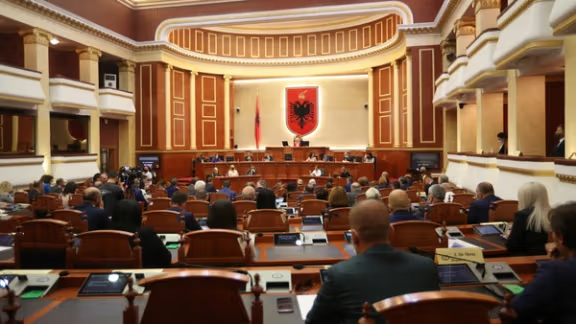
Albania's Parliament has reported a cyberattack in which Iran-based hackers attempted access to its data server, seeking to erase critical information.
A statement said Monday’s cyberattack, which temporarily halted parliament’s operations, had not “touched the data of the system.” The Associated Press cited local media as reporting that a cellphone provider and an air flight company were also targeted by cyberattacks Monday from “Iranian-based hackers called Homeland Justice.”
In the announcement published on the Telegram account of the group, 'Homeland Justice' claims to have deleted more than 2 petabytes of data of the telecommunications network and the internal network of all connected companies.
Iran International cannot independently verify if the hacker group is affiliated with Iran, but Albania has a history of being caught in the crossfire between the Islamic Republic and the Iranian exiled opposition group Mujahedeen-e-Khalq (MEK), currently based in Manza, an Albanian city near Durrës. In an X post after the parliament cyberattack, the hacker group called to “Destroy Durres Military Camp.”
In July 2022, Albania suffered a cyberattack that the government and multinational technology companies blamed on hackers linked to the Iranian Foreign Ministry. Believed to be in retaliation for Albania sheltering members of the MEK, the attack prompted the government to cut diplomatic relations with Iran two months later.
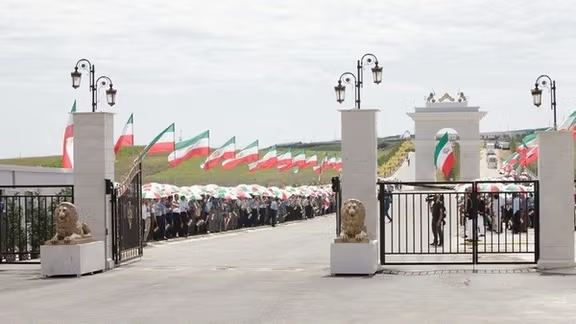
In June, the Albanian State Police, on the orders of the Special Court, raided the MEK camp, resulting in clashes between its residents and security forces. The police confiscated a large number of electronic and storage devices allegedly linked to prohibited political activities.Iran said earlier in the year that the storage devices were handed over to Tehran, but Albania denied the claim.
In one of their statements, the hacker group said, “Ignoring our 'humanitarian warnings cost your corrupt politicians all this. But don’t be fooled. This will continue until we completely clear the country of terrorists,” an apparent reference to the MEK. The group was on the US Foreign Terrorist Organization (FTO) list until 2012.
In recent years, MEK-affiliated hacktivist group ‘Uprising till Overthrow’ has breached hundreds of websites and servers belonging to the Iranian government such the office of the president and the foreign ministry, releasing troves of classified documents. In June 2022, it hacked over 5,000 security cameras of state bodies and 150 websites belonging to Tehran Municipality. The hack came after another cyberassault in March on the portal of the Ministry of Culture and Islamic Guidance (Ershad) and its affiliated websites. The attackers posted messages calling for the death of the country’s supreme leader.
MEK, a revolutionary organization with a Marxist-Islamist ideology emerged before the Iranian revolution in 1979 and for a time supported the new Islamist government in Tehran. But soon the ruling clerics decided they would not tolerate leftists and other organizations remaining active and launched bloody repression. MEK was exiled and many found refuge in Iraq under Saddam Hussein who helped them continue their fight against the government in Tehran. Since 2013, some 2,500 of the MEK members are sheltered in Albania, where they are not supposed to engage in any political activity and must abide by the country’s laws.